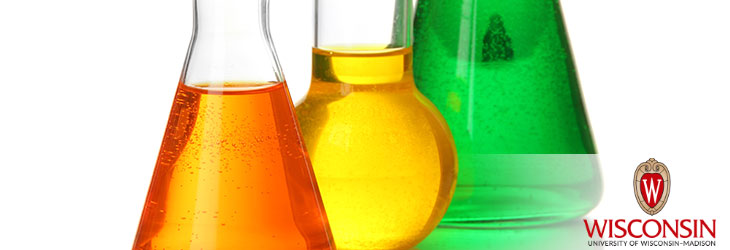Materials & Chemicals

Coating Extends Life of Catalytic System
WARF: P140345US01
Inventors: James Dumesic, Yomaira Pagan-Torres, Jeffrey Elam, Christopher Marshall, Joseph Libera
The Wisconsin Alumni Research Foundation (WARF) is seeking commercial partners interested in developing a method for improving the performance of catalyst support structures under hydrothermal and other hostile reaction conditions.
Overview
Biomass processing and many other industrial catalytic reactions are performed in hot, liquid conditions. These hydrothermal reactions may be carried out at elevated temperatures (e.g., 200 degrees C) and pressures (e.g., 400 psi) in the presence of water or steam.
Such harsh conditions take a toll on catalyst support structures, which can collapse and cause system failure. These structures often are made of mesoporous silica materials (MCM-41, SBA-15) that quickly degrade and need to be replaced. A more robust structure would ensure longer term performance.
Such harsh conditions take a toll on catalyst support structures, which can collapse and cause system failure. These structures often are made of mesoporous silica materials (MCM-41, SBA-15) that quickly degrade and need to be replaced. A more robust structure would ensure longer term performance.
The Invention
UW–Madison researchers have developed a coating that helps catalyst support structures withstand harsh reaction conditions.
The coating is made of a chemically robust material such as niobium oxide that can be applied in extremely thin layers using a technique called ALD (atomic layer deposition). The coating may be selected purely for its structure-enhancing properties, or may comprise materials that are themselves catalytically active.
The coating is made of a chemically robust material such as niobium oxide that can be applied in extremely thin layers using a technique called ALD (atomic layer deposition). The coating may be selected purely for its structure-enhancing properties, or may comprise materials that are themselves catalytically active.
Applications
- Catalyst manufacturing
- Biomass conversion
Key Benefits
- Enhances structural integrity/catalytic activity
- Improves long-term performance
- Commercially viable
Stage of Development
The researchers have demonstrated superior catalytic activity using mesoporous niobia material as an acid catalyst for the gas-phase dehydration of 2-propanol and for the gas/liquid-phase dehydration of 2-butanol. The incorporation of palladium nanoparticles improved other biomass conversion processes.
Additional Information
Related Technologies
Related Intellectual Property
Publications
- Pham H.N., Pagan-Torres Y.J., Serrano-Ruiz J.C., Wang D., Dumesic J.A. and Datye A.K. 2011. Improved Hydrothermal Stability of Niobia-Supported Pd Catalysts. Appl Catal A-Gen. 397, 153-162.
Tech Fields
For current licensing status, please contact Mark Staudt at [javascript protected email address] or 608-960-9845